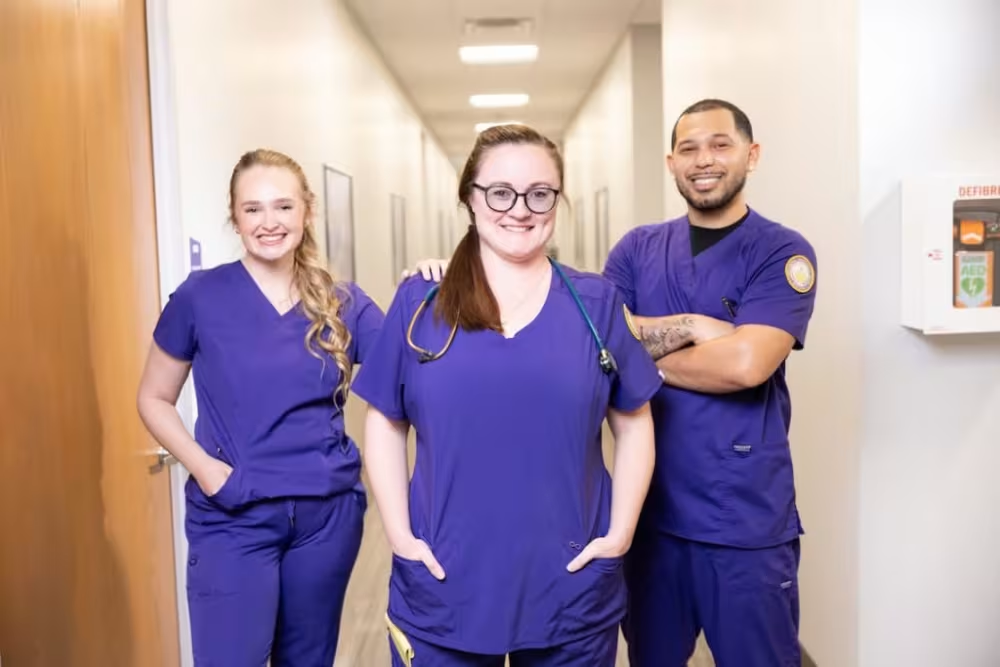Public Health Nurse: Duties, Skills, and Career Outlook
Each blog post is dated and contains accurate information as of that date. Certain information may have changed since the blog post publication date. If you would like to confirm the current accuracy of blog information, please visit our ABSN overview page or contact admissions at (866) 891-1371.
What does a public health nurse do? A public health nurse advocates for at-risk populations, striving to promote health, deliver health education, and increase healthcare access. Public health nurses provide direct patient care as well as advocate for policy improvements. They work in various settings, including nonprofits and government agencies.

From tracking foodborne illness outbreaks to creating public awareness campaigns, public health professionals are essential to promoting wellness and reducing the incidence of disease and injury.
Public health focuses on the health and well-being of entire populations at the local, regional, national, or even global level. Because of the broad scope of public health, the job of a public health nurse can vary, encompassing everything from care management to health education and primary care.
Public health nursing is one of the many specialties you might consider pursuing after becoming a registered nurse (RN). No matter where your nursing career takes you, you can start your journey at Concordia University Texas. Our Accelerated Bachelor of Science in Nursing (ABSN) track is designed specifically for those who are interested in switching to nursing and have a non-nursing bachelor’s degree or at least 60 college credits.
If you’re thinking about whether public health nursing might be the right career choice for you, you’ll first want to answer some common questions, such as “What does a public health nurse do?” and “Where do public health nurses work?” Then, consider the career requirements and potential for advancement to determine if it’s the right specialty for you.

Curious about what nursing school is like? Explore what you can expect from the ABSN track.
What Does a Public Health Nurse Do?
At its heart, public health nursing is about preventive wellness. This nursing specialty focuses on health education and promotion to reduce incidence rates of preventable health conditions. They track and analyze health data, such as disease outbreaks, and advocate for the resources communities need to respond to problems and safeguard health.
There is a particular emphasis on at-risk populations in public health. A public health RN strives to reduce health disparities among vulnerable populations. For example, pregnancy-related mortality rates are more than three times higher in Black, American Indian, and Alaska Native women than in white women.
A public health RN might research the factors driving this public health problem, advocate for policy changes, and develop programs designed to eliminate this health disparity.
Other areas of focus within the public health sphere can include:
- Environmental health
- Immunizations and disease prevention
- Infection prevention
- Occupational health
- Opioid crisis response
- Suicide prevention
Above all, public health professionals serve as advocates for at-risk populations. They focus on building community, driving systemic change, and working toward social justice to address health disparities.

Public Health RN Responsibilities
Public health nurses tackle a wide range of tasks, depending on their work setting, employer, and area of focus. Some of their responsibilities include:
- Advocating for public policy improvements to support public health
- Assessing risk factors and healthcare needs of a population, including evaluating healthcare availability and access
- Delivering healthcare education
- Developing health promotion and disease prevention strategies for specific community groups
- Identifying priorities for targeted interventions
- Gathering, organizing, and analyzing health data
- Managing budgets for programs that support public health
A public health nurse can also deliver care to individuals, particularly when working with at-risk and vulnerable populations in settings like community health clinics.
Where Can Public Health RNs Work?
Public health nurses can pursue employment in a wide variety of healthcare settings. Many work in government agencies at the county, state, and federal levels. Here, they may focus on public education initiatives, advocacy, and policy improvements.
Other common work settings for public health RNs include:
- Community health clinics
- Nonprofit organizations
- Outpatient clinics
- Schools, including universities

Is a career in rural nursing right for you?
Salary Expectations and Career Outlook
The U.S. Bureau of Labor Statistics (BLS) does not track salary or job growth for public health RNs specifically, but the overall data for RNs is favorable. According to the BLS, RNs earned a median annual salary of $93,600 as of May 2024. The job growth rate is projected to be 5% from 2024 through 2034, faster than average, indicating about 166,100 job openings during this period.
As of November 2024, over 64,000, or about 2.2%, of all nurses worked in community or public health specialties, according to the Health Resources and Services Administration (HRSA).
Essential Credentials for Public Health Careers
To become a public health RN, you’ll first need to earn a nursing degree. After graduation, you’ll take the NCLEX-RN licensure exam. Upon passing it, you can obtain a state-issued RN license.
Once you’re a licensed RN, look for job opportunities in public health nursing. After gaining work experience, you might be eligible to earn the certificate in public health (CPH) credential from the National Board of Public Health Examiners (NBPHE). While optional, this credential can enhance your career qualifications. You might also wish to return to school to earn a Master of Public Health (MPH) or a Master of Science in Nursing (MSN) with a concentration in public health nursing.
Career Advancement Opportunities for RNs in Public Health
Earning a graduate degree is a solid way to pursue career advancement opportunities in public health. The degree you pursue will depend on your career goals. If you enjoy providing direct care to patients and working with them one-on-one to build relationships and promote health, then you should pursue an MSN with a concentration in public health.
On the other hand, if you decide that your future lies in systems-level work, such as conducting public health research and advocating for population-level policy improvements, then you should consider earning an MPH. Either degree teaches advanced competencies, such as leadership skills, but the focus differs, so carefully consider your career goals before applying to a degree program.
There are many career growth possibilities to weigh, such as roles in administration, management, or nursing education. Policymaking, epidemiology, environmental health, and occupational health are some specialized areas to consider.

Discover 8 tips to increase your chances of getting into nursing school.
Concordia University Texas Welcomes Future Public Health RNs
If you feel called to pursue a career in public health nursing and have a non-nursing bachelor’s degree or college credits, then an accelerated BSN program might be right for you. Concordia University Texas’s ABSN track uses your prior education and accelerated nursing prerequisites as the foundation for your nursing education, so you can earn a BSN in as few as 16 months.
If you meet the eligibility requirements, you can fast-track your education to start working as a nurse. At Concordia University Texas, you’ll find a welcoming and supportive learning community. Contact an admissions counselor today and take advantage of our three start dates each year to jumpstart your career switch.
